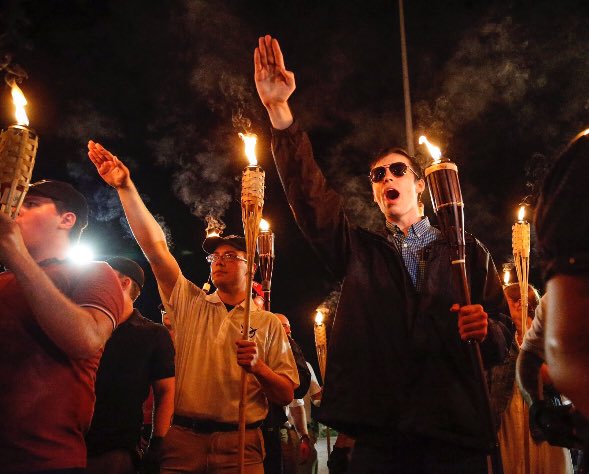
I had a dream a few nights ago about returning to school. This, after six years gone. I was standing in a hallway between deep currents of high school students. I faced a big window that looked north to the baseball field. The noise of the hallway was deafening. I felt such alarm, almost panic. All I remember thinking was, “I’m not ready. My room isn’t ready. What will I say?”
Another kind of anxiety now. After Charlottesville, I wondered how I would approach my classes if I were still up there (on that wonderful hill). What would I say?
Classrooms are territories of constraint. Students are compelled to be present, orderly, attentive. Therefore, teachers have an absolute duty to be equally constrained in guarding their opinions. The goal of any teacher is to encourage his or her students to become independent thinkers, not replicants of that teacher’s jeremiads.
So I think I would take two days and address Charlottesville and racial justice in America, our open wound, our tragedy, our legacy, but do so by burrowing down, by showing the bone and muscle beneath the skin.
Perhaps I might pull from Ordinary Men by Christopher Browning and chart the ease with which normal human beings can be led to mass murder, commit the acts and return to their lives no more bothered than as if they had to shrug off the irritation of a pulled muscle.
I would reference Bloodlands: Europe Between Hitler and Stalin by Timothy Snyder and describe what hatred wedded to power and planning can accomplish.
I would ask them to consider parts of The True Believer by Eric Hoffer about how mass movements often create their own mythologies that are more powerful than facts, and how any of us, if we do not remain alert and questioning, can be seduced and willingly let go of our individual selves to be replaced by the comfort of belonging.
I would read from The Slave Ship: A Human History by Marcus Rediker and describe the methodology by which slaves were captured, transported and how they built American wealth. Then I would ask them to read Robert Hayden’s poem Middle Passage and reflect upon the details that went to create that wealth (listen to the poem)
Maybe I would speak of Robert E. Lee in 1859 and his command to lay lashes upon the backs of 3 runaway slaves, his property, one a woman, and then pour salt upon the wounds, an order so awful his overseer would not carry it out, and thus Lee had to hire the local Constable to inflict the punishment.
If they were old enough, I would reference the site Without Sanctuary and ask them to meditate upon the bodies and upon the men and women and children gathered for the ‘entertainment’. I would tell them the story of Zacharia Walker, lynched in Coatesville in 1911.
I would ask them to imagine the weight of the white gaze upon black skin and the instructions black parents must give to their children when they are learning to drive.
I would ask them to think about the pervasive, never-gone, quality of history and its effects upon their own lives.
Never once would I mention the President’s name. His name and presence, already so pervasive, would be purposely kept from my voice. These books will serve students and their hearts and minds long after this President disappears.
Mike, you and I are always of the same mind here. Having grown up in the south, somehow, I knew even as a kid that the way black people treated was inhuman, dehumanizing and mean for no reason at all and done to people who could not fight back So I have always been very sensitive to injustice, and cruelty for no reason but to inflate ones importance. NEVER would accept a nazi flag. Thanks for the article!